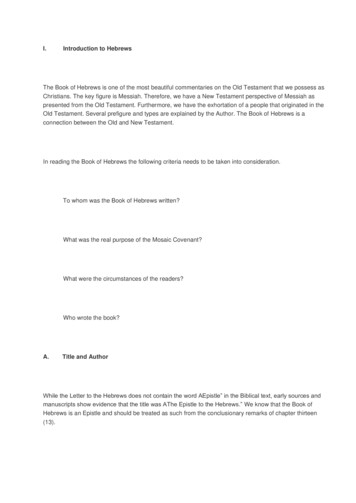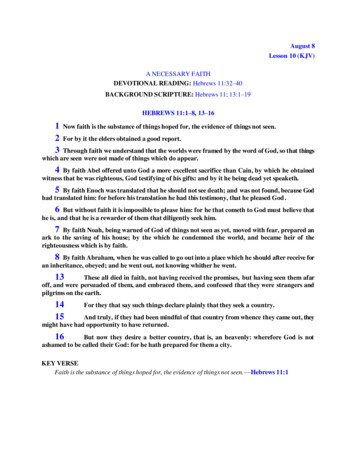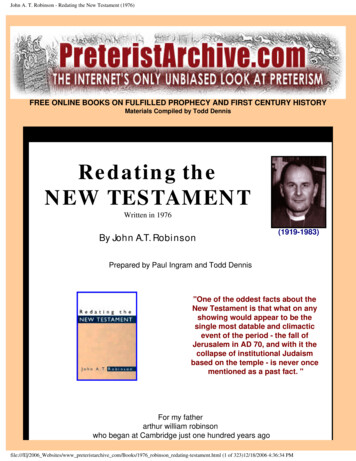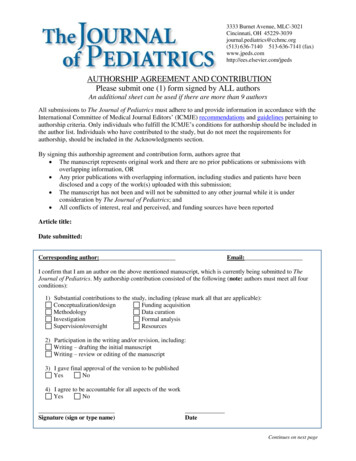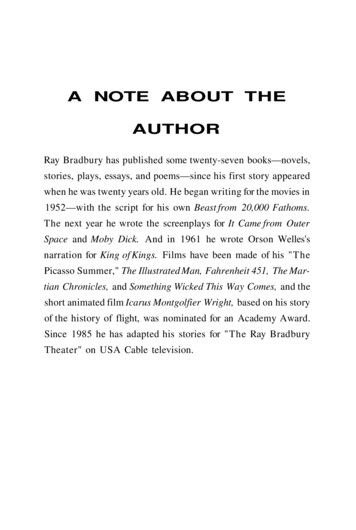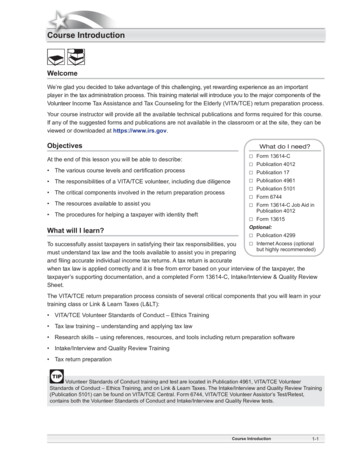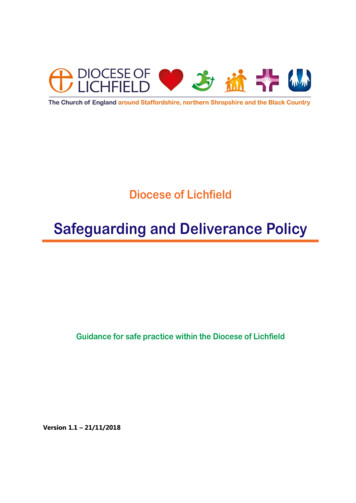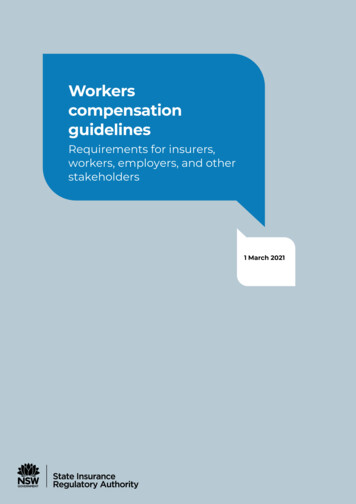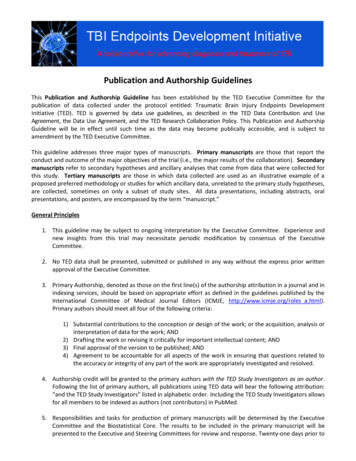
Transcription
Publication and Authorship GuidelinesThis Publication and Authorship Guideline has been established by the TED Executive Committee for thepublication of data collected under the protocol entitled: Traumatic Brain Injury Endpoints DevelopmentInitiative (TED). TED is governed by data use guidelines, as described in the TED Data Contribution and UseAgreement, the Data Use Agreement, and the TED Research Collaboration Policy. This Publication and AuthorshipGuideline will be in effect until such time as the data may become publically accessible, and is subject toamendment by the TED Executive Committee.This guideline addresses three major types of manuscripts. Primary manuscripts are those that report theconduct and outcome of the major objectives of the trial (i.e., the major results of the collaboration). Secondarymanuscripts refer to secondary hypotheses and ancillary analyses that come from data that were collected forthis study. Tertiary manuscripts are those in which data collected are used as an illustrative example of aproposed preferred methodology or studies for which ancillary data, unrelated to the primary study hypotheses,are collected, sometimes on only a subset of study sites. All data presentations, including abstracts, oralpresentations, and posters, are encompassed by the term “manuscript.”General Principles1. This guideline may be subject to ongoing interpretation by the Executive Committee. Experience andnew insights from this trial may necessitate periodic modification by consensus of the ExecutiveCommittee.2. No TED data shall be presented, submitted or published in any way without the express prior writtenapproval of the Executive Committee.3. Primary Authorship, denoted as those on the first line(s) of the authorship attribution in a journal and inindexing services, should be based on appropriate effort as defined in the guidelines published by theInternational Committee of Medical Journal Editors (ICMJE, http://www.icmje.org/roles a.html).Primary authors should meet all four of the following criteria:1) Substantial contributions to the conception or design of the work; or the acquisition, analysis orinterpretation of data for the work; AND2) Drafting the work or revising it critically for important intellectual content; AND3) Final approval of the version to be published; AND4) Agreement to be accountable for all aspects of the work in ensuring that questions related tothe accuracy or integrity of any part of the work are appropriately investigated and resolved.4. Authorship credit will be granted to the primary authors with the TED Study Investigators as an author.Following the list of primary authors, all publications using TED data will bear the following attribution:“and the TED Study Investigators” listed in alphabetic order. Including the TED Study Investigators allowsfor all members to be indexed as authors (not contributors) in PubMed.5. Responsibilities and tasks for production of primary manuscripts will be determined by the ExecutiveCommittee and the Biostatistical Core. The results to be included in the primary manuscript will bepresented to the Executive and Steering Committees for review and response. Twenty-one days prior to
submission, a complete draft will be circulated to the Executive Committee for review and comment.6. Secondary and tertiary manuscripts are strongly encouraged and may be initiated by any participatingTED investigator. Two-page proposals for secondary and tertiary manuscripts must include a tentativetitle, primary author(s), background/rationale, and statistical analysis plan (see template in Appendix 1)and must be submitted to the Executive Committee in care of Contact Principal Investigator, Geoffrey T.Manley, MD PhD via the Project Administrator (brian.fabian@ucsf.edu). Consultations with theBiostatistical Core are essential to developing adequate statistical plans prior to final submission to theExecutive Committee. Clinical site statisticians and epidemiologists are encouraged to participate inthese consultations, which should take place after proposal submission to the Executive Committee andacceptance by the TED Steering Committee, and before posting on the One Mind Portal. All submittedand finalized proposals will be posted on the One Mind Portal for review and comment by all TED PIsand co-Is. All eligible proposals will be presented, discussed, reviewed, and voted on either duringSteering Committee meetings, or via email ballot within 14 days following the meeting. Approval will bedetermined by simple majority.7. Each secondary and tertiary manuscript proposal will identify a primary author/writing group leader,who will be responsible for assigning tasks to members of the writing group. To uphold the authorshipcriteria presented in General Principle 3, it is expected that primary authors will delegate writingresponsibilities early enough so that all members of the writing group are given the opportunity tocontribute substantively. The primary author will have sole responsibility for ensuring that authorshiporder has been discussed and confirmed by co-authors. There is no prescribed limit of authors fromeach institution; however, each named author must have contributed significantly to the manuscript asdescribed above. If there is a disagreement among the potential co-authors, the Executive Committeewill determine inclusion of an author and/or order. If agreement cannot be reached by the ExecutiveCommittee, Michael Weiner, MD PhD, of the TED Scientific Advisory Board will be the tie-breaker andserve as mediator. For secondary (and possibly tertiary) manuscripts, the author list will include thenamed authors followed by “and the TED Study Investigators.”8. Before submission of an abstract to a scientific meeting, it is expected that the associated data analysesand interpretation will be completed. The abstract, data tables, and text of the interpretation will besubmitted to the Executive Committee and posted on the One Mind Portal for comment and thedesignated author(s) will present their data and interpretation (10-minute presentation) to theExecutive Committee for discussion and review during an Executive Committee telephone meeting. TheExecutive Committee will discuss the presentation and approve submission by simple majority vote. It isexpected that the resultant manuscript will be submitted to a journal by or before 3 months followingpresentation of the abstract at the scientific meeting. The same process is required before submitting amanuscript to a journal if no associated abstract has been previously approved.9. If preparation and submission of manuscripts is not accomplished in a timely manner (within six monthsfollowing the receipt of data), the Executive Committee reserves the right to delegate manuscriptwriting responsibility to another investigator. These requirements are in place to ensure the timelypublication and dissemination of study results to the public and the scientific community.10. Using TED data as preliminary data for grant submission by investigators at participating institutions isencouraged. However, any data tables included in a grant proposal must be approved by the SteeringCommittee before submission.11. Proposals for single-site analyses of TED data will be handled the same way as multi-site analyses.12. The Steering Committee will consider requests from unrelated third parties for access to study data forresearch and publication purposes prior to the data becoming available publically. All parties obtaining
access to the data will agree to abide by the obligations of the TED Data Use Agreement and as set forthin this Guideline.13. All authors are responsible for notifying the Executive Committee (via email to Brian Fabianbrian.fabian@ucsf.edu) of all accepted manuscripts, abstracts, and oral and poster presentations, aswell as the journal, date of publication, page number(s) and other information necessary to referencethe publication/presentation. The TED Administrative Core will maintain a central list of all acceptedabstracts, presentations and publications relating to TED, which will be posted on the TED Web site.Acknowledgements1. As this study was sponsored by external sources an acknowledgement is required on all publications.“Sponsored by the U.S. Department of Defense (Grant #W81XWH-14-2-0176), and our public and privatepartners. The opinions or assertions contained here are the private views of the authors and are not to beconstrued as official or as reflecting the views of any sponsor.”2. Contributions from other collaborators, including laboratory, economists, scientists, consultants or otherindividuals providing expertise during the trial design, conduct and manuscript processes but notmembers of the official TED Study Investigators and not meeting the prescribed authorship criteriashould also be listed in the acknowledgments.TED Executive CommitteeNameGeoffrey Manley, MD, PhDHarvey Levin, PhDJoseph Giacino, PhDMichael McCrea, PhDMurray Stein, MD MPHNancy Temkin, PhDRamon Diaz-Arrastia, MDSteven Wisniewski, PhDSureyya Dikmen, PhDRoleContact PI, Admin Core LeaderPI, Outcomes Core LeaderPI, Clinical/Rehab Core LeaderPI, Outcomes Core LeaderPI, Outcomes Core LeaderPI, Biostatistics Core LeaderPI, Emerging Tech Core LeaderPI, Biostatistics Core LeaderPI, Outcomes Core LeaderInstitutionUCSFBaylor Institute of MedicineSpaulding Rehabilitation CenterMedical College of WisconsinUniversity of California, San DiegoUniversity of WashingtonCenter for Neuroscience andRegenerativeMedicine, USUHSUniversityof PittsburghUniversity of WashingtonTED Steering CommitteeNameGeoffrey Manley, MD PhDArthur Toga, PhDClaudia Robertson, MDDavid Cifu, MDDavid Okonkwo, MD PhDDavid W. Wright, MDHarvey Levin, MDJames Kelly, MDJohn Whyte, MD PhDJoseph Giacino, PhDKevin Guskiewicz, PhDMichael McCrea, PhDMichael Weiner, MDMurray Stein, MD MPHRoleContact PI, Admin Core LeaderInformatics CoreClinical & Rehabilitation CoreClinical & Rehabilitation CoreClinical & Rehabilitation CoreClinical & Rehabilitation CoreOutcomes CoreOutcomes CoreClinical & Rehabilitation CoreClinical & Rehabilitation CoreOutcomes CoreOutcomes CoreNeuroimaging CoreOutcomes CoreInstitutionUCSFUniversity of Southern CaliforniaBaylor College of MedicineVirginia Commonwealth UniversityUniversity of PittsburghEmory UniversityBaylor College of MedicineNational Intrepid Center of ExcellenceMoss Rehabilitation Research Inst.Spaulding Rehabilitation CenterUniversity of North CarolinaMedical College of WisconsinUCSFUniversity of California, San Diego
Nancy Temkin, PhDPratik Mukherjee, MD PhDRamon Diaz-Arrastia, MD PhDBiostatistics CoreNeuroimaging CoreEmerging Technologies CoreRick Williams, PhDRobert Knight, MDStephen Wisniewski, PhDSureyya Dikmen, PhDWilliam Jagust, MDBiostatistics CoreEmerging Technologies CoreBiostatistics CoreOutcomes CoreEmerging Technologies CoreUniversity of WashingtonUCSFUniformed Services University of theHealth SciencesRTI InternationalUniversity of California, BerkeleyUniversity of PittsburghUniversity of WashingtonUniversity of California, Berkeley
Appendix 1TBI Endpoints Development InitiativeResearch Collaboration Proposal Request FormInstructions: A completed and approved Research Collaboration Proposal Request is required to be submittedto the TED Executive Committee (care of brian.fabian@ucsf.edu) and should be no more than 2 pages long.Authors are encouraged to contact the Biostatistics Core to receive assistance with the statistical analysis plan.Clinical site statisticians are also encouraged to participate in these consultations. Proposals will be reviewed bythe TED Executive Committee. All aspects of manuscript development will be governed by this Guideline.Proposals should contain the following elements:Date:Investigator’s Name:Clinical Center:E-mail:Telephone:TED Sponsor (if not a TED investigator):Other investigators who will be working on this analysis:Analysis Plan Title:TED Metadataset studies to be used:Please attach a 2-page description of your analysis plan. Please include the following:1) Short background/rationale for addressing the research question2) Primary variables to be used in the analysis (please provide mock tables)3) Brief description of methods and statistical analysis plan4) What is the impact if successful?
Joseph Giacino, PhD Clinical & Rehabilitation Core Spaulding Rehabilitation Center Kevin Guskiewicz, PhD Outcomes Core University of North Carolina Michael McCrea, PhD Outcomes Core Medical College of Wisconsin Michael Weiner, MD Neuroimaging Core UCSF Murray Stein, MD MPH Outcomes Core University of California, San Diego


